Midweek Review
Will AKD’s ‘Glasnost and Perestroika’ moment redefine Sri Lanka’s destiny?
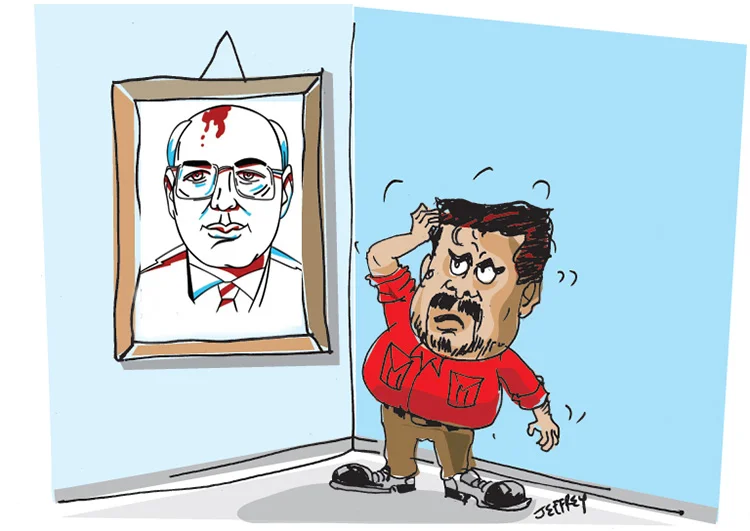
By Gamini Jayaweera
In 1985, former Soviet leader Mikhail Gorbachev, who assumed the presidency of the USSR, sought to reform the Soviet Union’s centrally planned economic system, which had been stagnant for several years. He recognised that the rigid one-party rule political system, including its politicians, was plagued by corruption, the workforce was inefficient, technology was outdated, and citizens struggled to access basic goods and services. Additionally, democratic rights for the people and the media were severely restricted. All of this was occurring under a communist system of government in a vast nation.
Gorbachev’s attempt to reform Russia’s struggling economic, social, and political systems through his Glasnost (openness) and Perestroika (restructuring) initiatives failed. This was largely due to resistance from the Central Committee of the Communist Party, which was dominated by hardline communist ideologists opposed to Western-style economic and political reforms. This resistance, combined with a failed coup, ultimately weakened Gorbachev’s authority, paving the way for Boris Yeltsin, whose neoliberal reforms transformed Russia’s political landscape.
Decades later and thousands of miles away, Sri Lanka faces its own political, economic, and social challenges. President Anura Kumara Dissanayake (AKD) and his coalition, the National People’s Power (NPP), rose to power amidst a bankrupt economy, decades of political corruption, a largely inefficient and overstaffed state workforce, use of outdated technology, and mounting debts hindering development. Despite operating within a democratic system, the underlying challenges appear strikingly similar to those faced by Gorbachev, highlighting a parallel between the two countries’ governance mechanisms, but one under communism and the other under the guise of democracy.
AKD is pursuing his economic policy to balance socialist welfare programmes with capitalist economic reforms to revive the economy. Like Gorbachev, AKD’s reforms aim to modernise the Sri Lankan economy without abandoning socialism. The introduction of limited market reforms, decentralising economic control, and encouraging private enterprise may undermine the central authority of the leftist Janatha Vimukthi Peramuna (JVP) which control the lion share of the NPP coalition, leading to political instability and the rise of nationalist movements within Sri Lanka.
However, the political dynamics, including resistance from extreme left-wing factions and right-wing opponents, could determine the outcome of AKD’s ambitious agenda. While history does not necessarily repeat itself, the spectre of political instability remains a concern.
AKD’s “Glasnost and Perestroika”
Creating “A Rich and Beautiful Country” is the bold and inspiring vision articulated by the newly elected President and the parliamentary members of the National People’s Power (NPP) government, as detailed in their manifesto and policy documents. The President of Sri Lanka, a charismatic and inspiring leader of the NPP, recently delivered a heartfelt and enthusiastic address to parliament and the nation.
In his address, he outlined his ambitious vision and expectations for steering our country onto a path of sustainable prosperity. Delivered without the aid of written notes, his speech was a commendable demonstration of his dedication and sincerity. As Sri Lankans, we take pride in the President’s energy and unwavering commitment to turning his vision into reality.
However, this vision, no matter how inspiring, faces critical challenges. Can the NPP government translate the ambitious goals outlined in their policy documents and the President’s impassioned words into tangible outcomes? Achieving such a transformative vision requires a meticulous and coordinated effort, along with all the necessary components to overcome the significant hurdles ahead.
My focus here, rather than attempting an exhaustive analysis, is to highlight a few pressing concerns that demand immediate attention in order to secure the success and integrity of this transformative journey of achieving “Glasnost and Perestroika.” As a hopeful Sri Lankan committed to systemic change, I wish to underscore these concerns within the NPP administration that could impede our collective vision for progress.
NPP Leadership
Effective leadership is the cornerstone of good governance, guiding nations towards progress and stability. In the context of the NPP government, the transition from trade union advocacy to ministerial leadership presents unique challenges and opportunities.
The President and the Cabinet hold the highest level of leadership in the government, serving as the architects of national direction and policy formulation. They entrust the heads of departments with the responsibility of implementing these policies through their ministerial secretaries. However, effective leadership demands clarity and unity. If Ministers and their Secretaries fail to provide a cohesive and unambiguous direction to the department heads within each ministry, the result will be organisational chaos. This challenge is particularly relevant given the leadership background of several ministers in the NPP government.
Several ministers in the NPP government were formerly trade union leaders before their recent appointments to ministerial positions. While their prior roles involved leading, advocating, and vigorously championing the demands of the workforce, particularly in the public sector, ministerial responsibilities require a fundamentally different approach. Administering and addressing the needs of the workforce as the primary representative of the government, which acts as both the “Owner” and “Financier” of public organisations, demands a much more nuanced and balanced perspective.
An assertive, advocacy-driven leadership style must evolve into a more balanced approach that considers the needs of all stakeholders. Without adopting this more inclusive mindset, ministers risk alienating sations, thereby jeopardising the systemic changes, and both short and long-term progress envisioned by the President. So far, we have witnessed some ministers who were affiliated with trade unions in the past not having transformed their new roles to act impartially to unite the management and the workforce in their ministries.
It is also important to acknowledge that this cabinet includes ministers who embody these balanced leadership qualities. The President, along with other senior and experienced ministers, must take the lead in mentoring and guiding the younger, energetic, but less experienced members of the team. By providing direction and fostering a collaborative environment, they can ensure that public expectations are met, and the government stays on course toward achieving its overarching goals.
Humility and credibility
Since the inception of NPP’s governance, a recurring and concerning pattern has emerged among certain ministers, a belief in their own infallibility and a persistent perception that the opposition is perpetually wrong. This mindset not only risks stifling constructive debate but also undervalues the diverse experiences, skills, and ideas that others bring to the table.
A similar tendency can be observed globally, where some politicians treat their political ideologies as the ultimate truth, often dismissing differing perspectives. This approach fosters polarisation and inhibits meaningful collaboration. Within the NPP leadership, it is essential to recognise that, no matter how diligently they work, the attitudes and behaviours of the leadership team can significantly hinder progress.
True leadership demands humility, an often-overlooked quality that is far from a weakness. Instead, humility forms the cornerstone of effective leadership, helping to build trust, foster collaboration, and ensure sustainable success. By embracing humility, leaders can create an environment where diverse viewpoints are valued, and progress is achieved through collective effort.
Integrity among Ministers is essential for gaining the trust and recognition of the public. During the former Speaker’s qualifications controversy, the Opposition justifiably announced plans to bring a no-confidence motion against him for dishonesty.
A Minister who was previously a Trade Union leader, publicly dismissed the motion without examining the facts or acknowledging the embarrassment caused to the NPP government. Such statements demonstrate blind loyalty to party colleagues, lack of experience, responsibility, caution, and trade union mentality. The President, in contrast, declared that “wrongdoing would not be tolerated regardless of rank or position,” a stance that led to the Speaker’s resignation. This demonstrates decisive leadership and a commitment to accountability, qualities that others in government should emulate.
The inexperienced, young Minister in question would do well to take a page from the President’s book. Credibility and integrity, once lost, are nearly impossible to regain. Leaders must exercise care and responsibility when commenting on matters of public concern.
So far, no action has been taken for the allegations that some Members of Parliament from the NPP and the Opposition have given misinformation about their educational qualifications during the election campaigns. It is crucial for the President or the Leader of the House to address these claims promptly to prevent further distractions and maintain public trust.
Cultural Changes and Motivation
Culture is not a “soft” subject, yet most political leaders and public sector organisational heads treat it as if it were. Culture embodies the behaviours of employees and the infrastructure of the organisation. It is the foundation on which success is built.
Driving cultural change is no easy task. A key strategy is to provide comprehensive training that fosters employee engagement and ownership. Sustainable change hinges on behavioural performance, reinforced by a structured system of incentives, support, and motivation.
It cannot be transformed merely through lofty speeches extolling the “honesty” of the ruling party, especially when directed at workers in the public sector. Similarly, continually decrying the “dishonesty” of previous regimes does little to foster meaningful change. Leaders in the NPP should avoid complacency regarding their reputation for “honesty,” as their tenure in government is relatively brief and largely untested.
Importance of the human touch, education, and motivation in achieving success,
especially when tackling complex challenges is essential. There are no quick fixes when it comes to changing human behaviour. Organisational transformation is a gradual, deliberate process, but one that is essential for cultivating a high-performing, responsive public sector which is a major part in the System Change.
Govt. Tender Process
A recent parliamentary debate exposed concerns over the Mannar Wind Farm Project’s tender process. Despite the Tender Evaluation Committee (TEC) and Procurement Appeal Board (PAB) recommending the disqualification of two non-compliant companies, the new Energy Minister annulled the initial process, introduced a fresh tender process, and awarded the contract to an originally rejected bidder. The Minister claimed the new contract was cheaper.
This raises serious concerns about political interference in Sri Lanka’s renewable energy sector. As a professional with nearly 40 years of experience in construction spanning Procurement to Final Accounts in the UK and Sri Lanka, I find this deviation from proper tendering procedures deeply concerning.
A professional tender evaluation considers not just cost but also technical capability, organisational strength, commercial factors, health and safety standards, and relevant experience in similar projects. Low initial bids can often lead to escalated costs through variations and claims, ultimately exceeding the most economically advantageous bid.
If the Minister prioritised cost alone, a direct negotiation with a local contractor would have been more transparent, avoiding wasted public funds and unfair costs to other bidders. This incident casts a serious shadow over the NPP’s commitment to integrity and fair play in the tendering process, raising critical questions about accountability in public procurement.
Conclusion
While the NPP government has been in power for nearly six months, it is understandable that the public’s expectations and scrutiny are high. The trust and hope that the Sri Lankan people have placed in the NPP come with heightened vigilance, as even the smallest misstep by the new administration could be seen as jeopardising what many view as the nation’s last chance to set a sustainable course for the future.
The path to reform will undoubtedly be challenging and fraught with obstacles. Yet, it is a journey we must undertake, not only to honour the hopes of the present but to secure a brighter future for generations to come. It will be interesting to witness the successful implementation of Sri Lanka’s version of AKD’s “Glasnost and Perestroika,” especially since the originator of this concept, former Soviet leader Mikhail Gorbachev, faced significant challenges and ultimately did not achieve his intended outcomes three decades ago.
However, for AKD’s vision to succeed, it is crucial for all citizens to actively support but demand accountability from the President and his Cabinet as they navigate this difficult transformative phase. Their leadership will be vital in uplifting the economic, social, legal, and political systems while enhancing democracy as the foundation for realising Sir Lanka’s own “Glasnost and Perestroika.”
Midweek Review
Batalanda and complexities of paramilitary operations
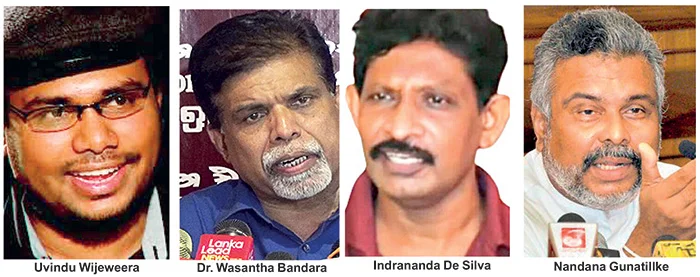
Former President Ranil Wickremesinghe’s recent combative ‘Head-to-Head’ interview with British-American Mehdi Hasan on Al Jazeera has opened a can of worms. As to why Hasan raised the Batalanda Presidential Commission report, during a 49-minute interview conducted at the London’s Conway Hall, with a clearly pro LTTE audience, remains a mystery. This must be yet another notorious way to show how even-handed they are as in the case of its coverage of Russia, China, Palestine or Ukraine for their gullible viewers.
Recorded in February and aired in March 2025, the interview is definitely the most controversial the UNP leader, who is also an Attorney-at-Law, ever faced during his political career; always used to getting kid glove treatment, especially after taking over the party in 1994.
The continuing public discourse on Batalanda should provoke a wider discussion on Sri Lanka’s response to separatist Tamil terrorism, since the cold blooded murder of Jaffna SLFP Mayor Alfred Duriappah, which signalled the beginning of the LTTE terror campaign that ended in May 2009 with the crushing military defeat of the Tigers on the banks of the Nathikadal lagoon, as well as two southern insurgencies in 1971 and 1987-1990.
As Nandana Gunatilleke (one time JVP General Secretary and ex-MP), Dr. Wasantha Bandara (ex-JVPer and close associate of the slain JVP leader Rohana Wijeweera), Indrananda de Silva (ex-JVPer, incumbent Central Committee member of Frontline Socialist Party [FSP] and ex-military photographer) and Uvindu Wijeweera (Rohana Wijeweera’s son and leader of Dewana Parapura) agreed during the recent Hiru ‘Balaya’ discussion, conducted by Madushan de Silva, the Batalanda operation was in line with the overall counter-terrorist/insurgency strategy of the then government.
The issues at hand cannot be discussed at all without taking into consideration the JVP terrorism that, at one-time, almost overwhelmed the UNP’s unbroken rule, since 1977, carried out while openly brushing aside most of the universally accepted genuine parliamentary norms. The country’s second Republican constitution, promulgated by the UNP regime with a 5/6 majority in Parliament, in 1978, had been amended no less than 13 times by the time they were finally ousted in 1995. This was mainly to facilitate their continuous rule. Unfortunately, all stakeholders have sought to take advantage of Batalanda, thereby preventing a proper dialogue. Quite surprisingly, none of the guests, nor the interviewer, bothered, at least, to make a reference to the JVP bid on President J.R. Jayewardene’s life in Parliament on the morning of July 18, 1987. At the time, JVPer Ajith Kumara, working in the House as a minor employee, hurled two hand grenades towards JRJ, with the then Prime Minister Ranasinghe Premadasa seated next to JRJ. While one government MP lost his life, several others suffered injuries, including then National Security Minister Lalith Athulathmudali, whose spleen had to be removed.
At one point, Gunatilleke declared that they assassinated UNP MP for Tangalle Jinadasa Weerasinghe on July 3, 1987, in response to the government killing well over 100 people, in Colombo, protesting against the signing of the Indo-Lanka accord on July 29, 1987. The parliamentarian was killed near the Barawakumbuka-Welangahawela bridge on the Colombo-Rathnapura-Embilipitiya Road. The UNPer was killed on his way home after having declined Premier Premadasa’s offer to make an SLAF chopper available for him to reach home safely.
Against the backdrop of MP Weerasinghe’s assassination and the grenade attack on the UNP parliamentary group that claimed the life of Keethi Abeywickrema (MP for Deniyaya), the government had no option but to respond likewise. The operation, established at the Batalanda Housing scheme of the State Fertiliser Corporation, constituted part of the counter-insurgency strategy pursued by the UNP.
Those who called Batalanda complex Batalanda torture camp/ wadakagaraya conveniently forgot during the second JVP inspired insurgency, the military had to utilize many public buildings, including schools, as makeshift accommodation for troops. Of course the UNP established Batalanda under different circumstances with the then Industries Minister Ranil Wickremesinghe providing political authority. Batalanda had been an exclusive police operation though the Army had access to it whenever a requirement arose.
Those who had been suddenly withdrawn from the Northern and Eastern Provinces, to meet the rapidly evolving security threat in the South, required accommodation. FSP CC member Indrananada de Silva had received unhindered access to Batalanda in his capacity as a military photographer and the rest is history.
As to why Indrananda de Silva switched his allegiance to the FSP should be examined, taking into consideration his previous role as a trusted military photographer, formerly a Lance Corporal of the Military Police. An influential section of the JVP, led by Kumar Gunaratnam, formed the FSP in April 2012 though it didn’t receive the much anticipated public support. Both Indrananda de Silva and Nandana Gunatilleke, who aligned himself with the UNP, found fault with the JVP-led National People’s Power (NPP) over its handling of the Batalanada issue.
Paramilitary operations
Paramilitary operations had been an integral part of the overall counter-insurgency campaign, directed at the JVP responsible for approximately 6,600 killings. Among those death squads were PRRA primarily drawn from the SLMP (Sri Lanka Mahajana Party) and SRRA (the socialist Revolutionary Red Army). PRRA had close links with the Independent Student Union (ISU) whose leader Daya Pathirana was slain by the JVP. The vast majority of people do not remember that Daya Pathirana, who led the ISU during the turbulent 1985-1986 period, was killed mid-Dec. 1989. The second insurgency hadn’t started at that time though the JVP propagated the lie that they took up arms against the UNP government following the signing of the Indo-Lanka peace accord on July 29, 1987.
In addition to PRRA and SRRA, the government made use of paramilitary groups, namely Kalu balallu, Ukkusso, Rajaliyo, Kaha balallu, Kola koti, Rathu Makaru, Mapila, Gonussa, Nee, Keshara Sinhayo, Le-mappillu and Kalu koti.
The UNP also involved some elements of Indian trained Tamil groups (not of the LTTE) in paramilitary operations. Such operations, that had been backed by respective Cabinet Ministers, were supervised by local law enforcement authorities. Paramilitary operations had been in line with psychological warfare that was meant to cause fear among the JVP, as well as the general population. Military operations that had been combined with paramilitary actions received the blessings of the political leadership at the highest level. In the case of Batalanda (1988-1990) President J.R. Jayewardene and Ranasinghe Premadasa knew of its existence.
Even after the eradication of the top JVP leadership, by Nov. 1989, police, military and paramilitary operations continued unabated. Former JVPers appearing on ‘Balaya’ agreed that counter-insurgency operations were actually brought to an end only after D.B. Wijetunga succeeded President Ranasinghe Premadasa after the latter’s assassination on May Day 1993.
After the LTTE resumed war in June 1990, just a couple of months after the withdrawal of the Indian Army (July 1987-March1990), the UNP authorized paramilitary operations in the northern and eastern areas. Members of TELO, PLOTE, EPRLF as well as EPDP were made part of the overall government security strategy. They operated in large groups. Some paramilitary units were deployed in the Jaffna islands as well. And these groups were represented in Parliament. They enjoyed privileged status not only in the northern and eastern regions but Colombo as well. The government allowed them to carry weapons in the city and its suburbs.
These groups operated armed units in Colombo. The writer had the opportunity to visit EPDP and PLOTE safe houses in Colombo and its suburbs soon after they reached an understanding with President Ranasinghe Premadasa. Overnight at the behest of President Premadasa, the Election Department granted these Tamil groups political recognition. In other words, armed groups were made political parties. The Premadasa government accepted their right to carry weapons while being represented in Parliament.
It would be pertinent to mention that thousands of Tamil paramilitary personnel served the government during that period. There had been many confrontations between them and the LTTE over the years and the latter sought to eliminate key paramilitary personnel. Let me remind you of the circumstances, the EPRLF’s number 02 Thambirajah Subathiran alias Robert was sniped to death in June 2003. Robert was engaged in routine morning exercises on the top floor of the two-storeyed EPRLF office, on the hospital road, Jaffna, when an LTTE sniper took him out from the nearby Vembadi Girls’ high school. The operation of the Norway managed Ceasefire Agreement (CFA) made no difference as the LTTE removed Robert who led the party here in the absence of leader Varatharaja Perumal, the first and the only Chief Minister of the North-Eastern Province.
In terms of the CFA that had been signed by Premier Ranil Wickremesinghe and LTTE leader Velupillai Prabhakaran, in Feb. 2002, the government agreed to disarm all paramilitary personnel. Many wouldn’t remember now that during Premadasa’s honeymoon with the LTTE, the Army facilitated the LTTE onslaught on paramilitary groups in selected areas.
Muthaliff’s role
During the ‘Balaya’ discussion, the contentious issue of who shot JVP leader Rohana Wijeweera came up. Nandana Gunatilleke, who contested the 1999 Dec. presidential election. as the JVP candidate, pointing to an article carried in the party organ that dealt with Wijeweera’s assassination said that he wrongly named Gaffoor as one of the persons who shot their leader whereas the actual shooter was Muthaliff. The headline named Thoradeniya and Gaffoor as the perpetrators.
Declaring that he personally wrote that article on the basis of information provided by Indrananda de Silva, Gunatilleke named Asoka Thoradeniya and Tuan Nizam Muthaliff of the Army as the perpetrators of the crime. Thoradeniya served as Sri Lanka’s High Commissioner in the Maldives during the Yahapalana administration, while Muthaliff was killed by the LTTE in Colombo in late May 2005. The shooting took place at Polhengoda junction, Narahenpita. Muthaliff was on his way from Manning town, Narahenpita, to the Kotelawala Defence University.
The programme was told that the JVP had over the years developed close relationship with Thoradeniya while Indrananda de Silva accused Dr. Wasantha Bandara of duplicity regarding Muthaliff. How could you recognize Muthaliff, slain by the LTTE, as a war hero as he was actually one of the persons who shot Rohana Wijeweera, the latter asked.
At the time of his assassination, Muthaliff served as the Commanding Officer, 1 st Regiment Sri Lanka Military Intelligence Corps. The then parliamentarian Wimal Weerawansa was among those who paid last respects to Maj. Muthaliff.
At the time of Rohana Wijeweera’s arrest, Muthaliff served as Lieutenant while Thoradeniya was a Major. Indrananda de Silva strongly stressed that atrocities perpetrated by the police and military in the South or in the northern and eastern regions must be dealt with regardless of whom they were conducting operations against. The former JVPer recalled the Army massacre in the east in retaliation for the landmine blast that claimed the lives of Northern Commander Maj. Gen. Denzil Kobbekaduwa and a group of senior officers, including Brigadier Wijaya Wimalaratne, in early Aug. 1990 in Kayts.
Dr. Wasantha Bandara warned of the Western powers taking advantage of what he called false narrative to push for a Truth and Reconciliation Commission.
It would be pertinent to mention that the LTTE also used the underworld as well as some corrupt Army personnel in planning high profile assassinations. Investigations into the assassination of Muthaliff, as well as Maj. Gen. Parami Kulatunga, killed in a suicide attack at Pannipitiya, in June 2006, revealed the direct involvement of military personnel with the LTTE.
Indrananda de Silva disclosed that soon after Anura Kumara Dissanayake won the presidential election last September, the FSP, in writing, requested the JVP leader to inquire into killings during that period, including that of Rohana Wijeweera. The FSPer alleged that President Dissanayake refrained from even acknowledging their letter. Indrananda de Silva emphasized that Al Jazeera never disclosed anything new as regards Batalanda as he exposed the truth years ago. The former JVPer ridiculed the ruling party tabling the Batalanda Commission report in the wake of Wickremesinghe’s Al Jazeera interview whereas the matter was in the public domain for quite some time.
Indrananda de Silva and Nandana Gunatilleke exchanged words over the latter’s declaration that the JVP, too, was subjected to investigation for violence unleashed during the 1987-1990 period. While the FSPer repeatedly declared that those who carried out directives issued by the party were arrested and in some cases killed, Nandana Gunatilleke took up the position that the party should be held accountable for crimes perpetrated during that period.
The interviewer posed Nandana Gunatilleke the question whether he was betraying his former comrades after joining the UNP. Nandana Gunatilleke shot back that he joined the UNP in 2015 whereas the JVP joined UNP as far back as 2009 to promote retired Army Chef Sarath Fonseka’s presidential ambition even though he wiped out the JVP presence in Trincomalee region during the second insurgency.
JVP’s accountability
Nandana Gunatilleke is adamant that the party should accept responsibility for the killings carried out at that time. The former JVPer declared that Vijaya Kumaratunga (Feb. 16, 1988), first Vice Chancellor of the Colombo University (March 08, 1989) Dr. Stanley Wijesundera, Ven. Kotikawatte Saddhatissa thera (Aug. 03, 1988) and Chairperson of the State Pharmaceutical Corporation Gladys Jayewardene (Sept. 12, 1989) were among those assassinated by the JVP. SPC Chairperson was killed for importing medicine from India, the former Marxist aligned with the UNP said, while actor-turned-politician Kumaratunga’s assassination was attributed to his dealings with President J.R. Jayewardene.
According to Nandana Gunatilleke, except for a few killings such as General Secretaries of the UNP Harsha Abeywickrema (Dec 23, 1987) and Nandalal Fernando (May 20, 1988), the vast majority of others were ordinary people like grama sevakas killed on mere accusation of being informants. The deaths were ordered on the basis of hearsay, Nandana Gunatilleke said, much to the embarrassment of others who represented the interest of the JVP at that time.
One quite extraordinary moment during the ‘Balaya’ programme was when Nandana Gunatilleke revealed their (JVP’s) direct contact with the Indian High Commission at a time the JVP publicly took an extremely anti-Indian stance. In fact, the JVP propagated a strong anti-Indian line during the insurgency. Turning towards Dr. Wasantha Bandara, Gunatilleke disclosed that both of them had been part of the dialogue with the Indian High Commission.
It reminds me of the late Somawansa Amarasinghe’s first public address delivered at a JVP rally in late Nov. 2001 after returning home from 12 years of self-imposed exile. Of the top JVP leadership, Somawansa Amarasinghe, who had been married to a close relative of powerful UNP Minister Sirisena Cooray, was the only one to survive combined police/military/paramilitary operations.
Amarasinghe didn’t mince his words when he declared at a Kalutara rally that his life was saved by Indian Premier V.P. Singh. Soft spoken Amarasinghe profusely thanked India for saving his life. Unfortunately, those who discuss issues at hand conveniently forget crucial information in the public domain. Such lapses can be both deliberate and due to negligence.
By Shamindra Ferdinando
Midweek Review
Independent Monitor
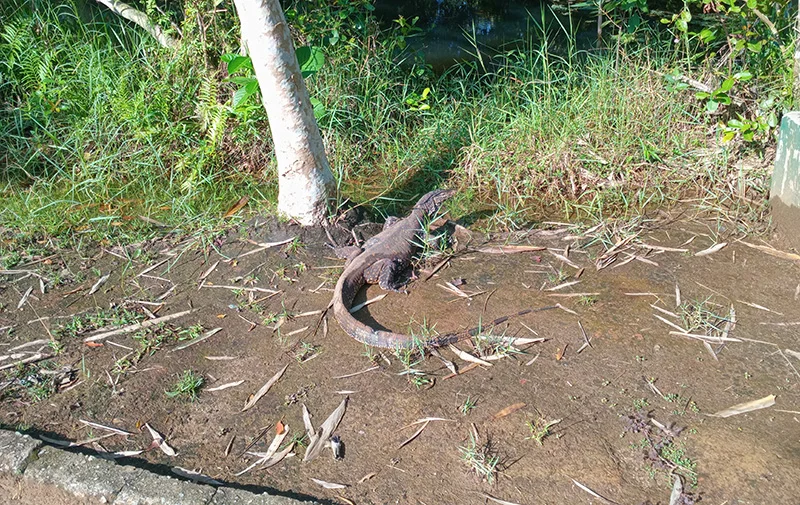
You may think sloth comes very easy,
To your kingly monitor of the shrinking marsh,
As he lies basking smugly in the morn sun,
But he is organized and alert all the while,
As he awaits his prey with patience infinite,
Free of malice, a professional of a kind,
His cumbrous body not slowing his sprite….
But note, he’s no conspirator spitting guile,
And doesn’t turn nasty unless crossed,
Nor by vengeful plans is he constantly dogged,
Unlike those animals of a more rational kind,
Whose ways have left behind a state so sorry.
By Lynn Ockersz
Midweek Review
Rajiva on Batalanda controversy, govt.’s failure in Geneva and other matters

Former President Ranil Wickremesinghe’s recent interview with Mehdi Hasan on Al Jazeera’s ‘Head-to-Head’ series has caused controversy, both in and outside Parliament, over the role played by Wickremesinghe in the counter-insurgency campaign in the late’80s.
The National People’s Power (NPP) seeking to exploit the developing story to its advantage has ended up with egg on its face as the ruling party couldn’t disassociate from the violent past of the JVP. The debate on the damning Presidential Commission report on Batalanda, on April 10, will remind the country of the atrocities perpetrated not only by the UNP, but as well as by the JVP.
The Island sought the views of former outspoken parliamentarian and one-time head of the Government Secretariat for Coordinating the Peace Process (SCOPP) Prof. Rajiva Wijesinha on a range of issues, with the focus on Batalanda and the failure on the part of the war-winning country to counter unsubstantiated war crimes accusations.
Q:
The former President and UNP leader Ranil Wickremesinghe’s interview with Al Jazeera exposed the pathetic failure on the part of Sri Lanka to address war crimes accusations and accountability issues. In the face of aggressive interviewer Mehdi Hasan on ‘Head-to-Head,’ Wickremesinghe struggled pathetically to counter unsubstantiated accusations. Six-time Premier Wickremesinghe who also served as President (July 2022-Sept. 2024) seemed incapable of defending the war-winning armed forces. However, the situation wouldn’t have deteriorated to such an extent if President Mahinda Rajapaksa, who gave resolute political leadership during that war, ensured a proper defence of our armed forces in its aftermath as well-choreographed LTTE supporters were well in place, with Western backing, to distort and tarnish that victory completely. As wartime Secretary General of the Government’s Secretariat for Coordinating the Peace Process (since June 2007 till the successful conclusion of the war) and Secretary to the Ministry of Disaster Management and Human Rights (since Jun 2008) what do you think of Wickremesinghe’s performance?
A:
It made him look very foolish, but this is not surprising since he has no proper answers for most of the questions put to him. Least surprising was his performance with regard to the forces, since for years he was part of the assault forces on the successful Army, and expecting him to defend them is like asking a fox to stand guard on chickens.
Q:
In spite of trying to overwhelm Wickremesinghe before a definitely pro-LTTE audience at London’s Conway Hall, Hasan further exposed the hatchet job he was doing by never referring to the fact that the UNP leader, in his capacity as the Yahapalana Premier, co-sponsored the treacherous Geneva Resolution in Oc., 2015, against one’s own victorious armed forces. Hasan, Wickremesinghe and three panelists, namely Frances Harrison, former BBC-Sri Lanka correspondent, Director of International Truth and Justice Project and author of ‘Still Counting the Dead: Survivors of Sri Lanka’s Hidden War,’ Dr. Madura Rasaratnam, Executive Director of PEARL (People for Equality and Relief in Lanka) and former UK and EU MP and Wickremesinghe’s presidential envoy, Niranjan Joseph de Silva Deva Aditya, never even once referred to India’s accountability during the programme recorded in late February but released in March. As a UPFA MP (2010-2015) in addition to have served as Peace Secretariat Chief and Secretary to the Disaster Management and Human Rights Ministry, could we discuss the issues at hand leaving India out?
A:
I would not call the interview a hatchet job since Hasan was basically concerned about Wickremesinghe’s woeful record with regard to human rights. In raising his despicable conduct under Jayewardene, Hasan clearly saw continuity, and Wickremesinghe laid himself open to this in that he nailed his colours to the Rajapaksa mast in order to become President, thus making it impossible for him to revert to his previous stance. Sadly, given how incompetent both Wickremesinghe and Rajapaksa were about defending the forces, one cannot expect foreigners to distinguish between them.
Q:
You are one of the many UPFA MPs who backed Maithripala Sirisena’s candidature at the 2015 presidential election. The Sirisena-Wickremesinghe duo perpetrated the despicable act of backing the Geneva Resolution against our armed forces and they should be held responsible for that. Having thrown your weight behind the campaign to defeat Mahinda Rajapaksa’s bid to secure a third term, did you feel betrayed by the Geneva Resolution? And if so, what should have the Yahapalana administration done?
A:
By 2014, given the total failure of the Rajapaksas to deal firmly with critiques of our forces, resolutions against us had started and were getting stronger every year. Mahinda Rajapaksa laid us open by sacking Dayan Jayatilleke who had built up a large majority to support our victory against the Tigers, and appointed someone who intrigued with the Americans. He failed to fulfil his commitments with regard to reforms and reconciliation, and allowed for wholesale plundering, so that I have no regrets about working against him at the 2015 election. But I did not expect Wickremesinghe and his cohorts to plunder, too, and ignore the Sirisena manifesto, which is why I parted company with the Yahapalanaya administration, within a couple of months.
I had expected a Sirisena administration to pursue some of the policies associated with the SLFP, but he was a fool and his mentor Chandrika was concerned only with revenge on the Rajapaksas. You cannot talk about betrayal when there was no faith in the first place. But I also blame the Rajapaksas for messing up the August election by attacking Sirisena and driving him further into Ranil’s arms, so that he was a pawn in his hands.
Q:
Have you advised President Mahinda Rajapaksa’s government how to counter unsubstantiated war crimes allegations propagated by various interested parties, particularly the UN, on the basis of the Panel of Experts (PoE) report released in March 2011? Did the government accept your suggestions/recommendations?
A:
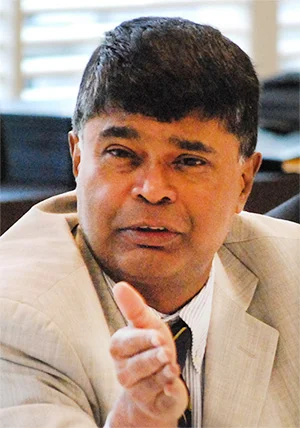
Prof. Rajiva Wijesinha
I kept trying, but Mahinda was not interested at all, and had no idea about how to conduct international relations. Sadly, his Foreign Minister was hanging around behind Namal, and proved incapable of independent thought, in his anxiety to gain further promotion. And given that I was about the only person the international community, that was not prejudiced, took seriously – I refer to the ICRC and the Japanese with whom I continued to work, and, indeed, the Americans, until the Ambassador was bullied by her doctrinaire political affairs officer into active undermining of the Rajapaksas – there was much jealousy, so I was shut out from any influence.
But even the admirable effort, headed by Godfrey Gunatilleke, was not properly used. Mahinda Rajapaksa seemed to me more concerned with providing joy rides for people rather than serious counter measures, and representation in Geneva turned into a joke, with him even undermining Tamara Kunanayagam, who, when he supported her, scored a significant victory against the Americans, in September 2011. The Ambassador, who had been intriguing with her predecessor, then told her they would get us in March, and with a little help from their friends here, they succeeded.
Q:
As the writer pointed out in his comment on Wickremesinghe’s controversial Al Jazeera interview, the former Commander-in-Chief failed to mention critically important matters that could have countered Hasan’ s line of questioning meant to humiliate Sri Lanka?
A:
How could you have expected that, since his primary concern has always been himself, not the country, let alone the armed forces?
Q:
Do you agree that Western powers and an influential section of the international media cannot stomach Sri Lanka’s triumph over separatist Tamil terrorism?
A:
There was opposition to our victory from the start, but this was strengthened by the failure to move on reconciliation, creating the impression that the victory against the Tigers was seen by the government as a victory against Tamils. The failure of the Foreign Ministry to work with journalists was lamentable, and the few exceptions – for instance the admirable Vadivel Krishnamoorthy in Chennai or Sashikala Premawardhane in Canberra – received no support at all from the Ministry establishment.
Q:
A couple of months after the 2019 presidential election, Gotabaya Rajapaksa declared his intention to withdraw from the Geneva process. On behalf of Sri Lanka that announcement was made in Geneva by the then Foreign Minister Dinesh Gunawardena, who became the Premier during Wickremesinghe’s tenure as the President. That declaration was meant to hoodwink the Sinhala community and didn’t alter the Geneva process and even today the project is continuing. As a person who had been closely involved in the overall government response to terrorism and related matters, how do you view the measures taken during Gotabaya Rajapaksa’s short presidency to counter Geneva?
A:
What measures? I am reminded of the idiocy of the responses to the Darusman report by Basil and Gotabaya Rajapaksa, who went on ego trips and produced unreadable volumes trying to get credit for themselves as to issues of little interest to the world. They were planned in response to Darusman, but when I told Gotabaya that his effort was just a narrative of action, he said that responding to Darusman was not his intention. When I said that was necessary, he told me he had asked Chief-of-Staff Roshan Goonetilleke to do that, but Roshan said he had not been asked and had not been given any resources.
My own two short booklets which took the Darusman allegations to pieces were completely ignored by the Foreign Ministry.
Q:
Against the backdrop of the Geneva betrayal in 2015 that involved the late Minister Mangala Samaraweera, how do you view President Wickremesinghe’s response to the Geneva threat?
A: Wickremesinghe did not see Geneva as a threat at all. Who exactly is to blame for the hardening of the resolution, after our Ambassador’s efforts to moderate it, will require a straightforward narrative from the Ambassador, Ravinatha Ariyasinha, who felt badly let down by his superiors. Geneva should not be seen as a threat, since as we have seen follow through is minimal, but we should rather see it as an opportunity to put our own house in order.
Q:
President Anura Kumara Dissanayake recently questioned both the loyalty and professionalism of our armed forces credited with defeating Northern and Southern terrorism. There hadn’t been a previous occasion, a President or a Premier, under any circumstances, questioned the armed forces’ loyalty or professionalism. We cannot also forget the fact that President Dissanayake is the leader of the once proscribed JVP responsible for death and destruction during 1971 and 1987-1990 terror campaigns. Let us know of your opinion on President Dissanayake’s contentious comments on the armed forces?
A: I do not see them as contentious, I think what is seen as generalizations was critiques of elements in the forces. There have been problems, as we saw from the very different approach of Sarath Fonseka and Daya Ratnayake, with regard to civilian casualties, the latter having planned a campaign in the East which led to hardly any civilian deaths. But having monitored every day, while I headed the Peace Secretariat, all allegations, and obtained explanations of what happened from the forces, I could have proved that they were more disciplined than other forces in similar circumstances.
The violence of the JVP and the LTTE and other such groups was met with violence, but the forces observed some rules which I believe the police, much more ruthlessly politicized by Jayewardene, failed to do. The difference in behaviour between the squads led for instance by Gamini Hettiarachchi and Ronnie Goonesinghe makes this clear.
Q:
Mehdi Hasan also strenuously questioned Wickremesinghe on his role in the UNP’s counter-terror campaign during the 1987-1990 period. The British-American journalists of Indian origins attacked Wickremesinghe over the Batalanda Commission report that had dealt with extra-judicial operations carried out by police, acting on the political leadership given by Wickremesinghe. What is your position?
A:
Wickremesinghe’s use of thugs’ right through his political career is well known. I still recall my disappointment, having thought better of him, when a senior member of the UNP, who disapproved thoroughly of what Jayewardene had done to his party, told me that Wickremesinghe was not honest because he used thugs. In ‘My Fair Lady,’ the heroine talks about someone to whom gin was mother’s milk, and for Wickremesinghe violence is mother’s milk, as can be seen by the horrors he associated with.
The latest revelations about Deshabandu Tennakoon, whom he appointed IGP despite his record, makes clear his approval for extra-judicial operations.
Q:
Finally, will you explain how to counter war crimes accusations as well as allegations with regard to the counter-terror campaign in the’80s?
A:
I do not think it is possible to counter allegations about the counter-terror campaign of the eighties, since many of those allegations, starting with the Welikada Prison massacre, which Wickremesinghe’s father admitted to me the government had engendered, are quite accurate. And I should stress that the worst excesses, such as the torture and murder of Wijeyedasa Liyanaarachchi, happened under Jayewardene, since there is a tendency amongst the elite to blame Premadasa. He, to give him his due, was genuine about a ceasefire, which the JVP ignored, foolishly in my view though they may have had doubts about Ranjan Wijeratne’s bona fides.
With regard to war crimes accusations, I have shown how, in my ‘Hard Talk’ interview, which you failed to mention in describing Wickeremesinghe’s failure to respond coherently to Hasan. The speeches Dayan Jayatilleke and I made in Geneva make clear what needed and still needs to be done, but clear sighted arguments based on a moral perspective that is more focused than the meanderings, and the frequent hypocrisy, of critics will not now be easy for the country to furnish.
By Shamindra Ferdinando
-

 News6 days ago
News6 days agoSeniors welcome three percent increase in deposit rates
-
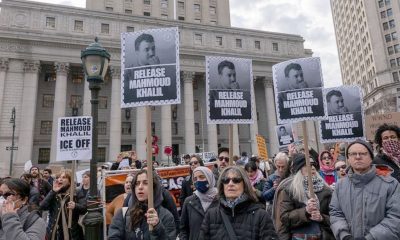
 Features6 days ago
Features6 days agoThe US, Israel, Palestine, and Mahmoud Khalil
-
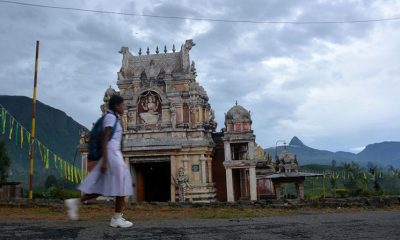
 News6 days ago
News6 days agoScholarships for children of estate workers now open
-
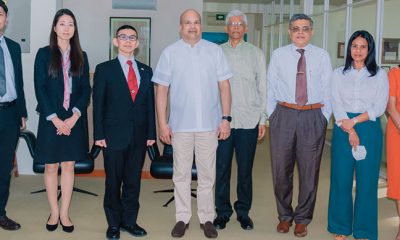
 News7 days ago
News7 days agoDefence Ministry of Japan Delegation visits Pathfinder Foundation
-
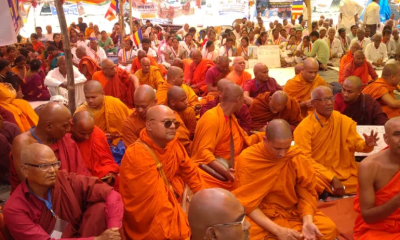
 Foreign News4 days ago
Foreign News4 days agoBuddhism’s holiest site erupts in protests over Hindu ‘control’ of shrine
-
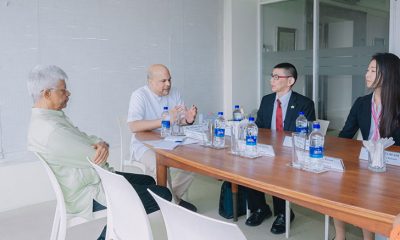
 News6 days ago
News6 days agoJapanese Defence Delegation visits Pathfinder
-

 Editorial7 days ago
Editorial7 days agoWhen promises boomerang
-
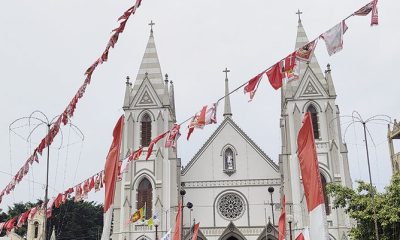
 News7 days ago
News7 days agoBan on altar girls upsets nuns, stirs talk on women’s church roles











